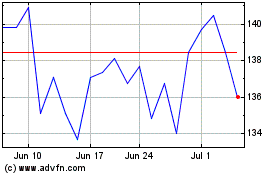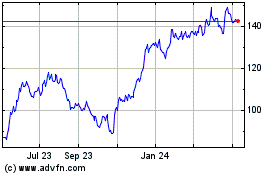Jan. NCO & Delinquency: A Mixed Bag - Analyst Blog
February 16 2012 - 10:37AM
Zacks
The regulatory filings by major credit card companies have
disclosed mixed results in credit card defaults and delinquency
rates for January 2012. According to these filings, three of the
nation's top six credit card companies reported lower rates of card
default and delinquency.
In comparison with the prior month, Bank of America
Corporation (BAC), American Express
Company (AXP) and Discover Financial
Services (DFS) recorded a fall in their respective credit
card defaults, whereas Citigroup Inc. (C),
JPMorgan Chase & Co. (JPM) and Capital
One Financial Corp. (COF) reported a surge for the
same.
Card companies usually write off the loans that are 180 days
past due, assuming those as uncollectible. For BofA, on an
annualized basis, net charges-off (NCO) rate fell to 5.63% in
January 2012 as against 6.05% in December 2011 and 9.2% in January
2011.
However, on an annualized basis, Capital One’s NCO rate surged
from 3.98% in the prior month but decreased from 6.79% in the
prior-year month to 4.08% in January 2012. Similarly, JPMorgan
reported a rise in NCO rate to 4.25% of its total loan balance in
January 2012 compared with 4.11% in December 2011 and 5.97% in
January 2011.
In January 2012, the delinquency rate, indicating the future
rate of default, dropped for BofA, JP Morgan and Discover
Financial, whereas it increased for Capital One and Citigroup;
however, American Express witnessed no change in it since December
2011.
For BofA, delinquency rate for 30 days or more (on an annualized
basis) slipped from 3.82% in December 2011 and 5.17% in January
2011 to 3.80%. Similarly, JPMorgan’s delinquency rate for 30 days
or more (on an annualized basis) fell slightly to 2.45%, compared
with 2.48% in December 2011 and 3.39% in January 2011.
Conversely, the delinquency rate for 30 days or more (on an
annualized basis) for Capital One was 3.78% in January 2012, up
from 3.66% in December 2011 but falling from 4.00% in January
2011.
Our Viewpoint
The decline in default rates has largely arisen from the
inability of the defaulting card holders to get cards with large
credit limits. Besides, this waning default trend signifies the
card owners’ improving financial condition. As these card owners
are gradually recovering from the after-effects of recession, they
are trying their level best to reduce their credit card debts.
Additionally, various regulatory reforms undertaken by the
Federal Reserve, including limiting the fees that banks can charge
and constricting the pace at which they can raise their interest
rates, are also enabling the card owners to bring down their
balances.
We believe that overall credit quality will continue to improve
in the near term. However, the pace of improvement would slow down,
given the sluggish economic recovery.
Currently, Discover Financial retains a Zacks #1 Rank, which
implies a short-term Strong Buy while, Capital One, JPMorgan,
American Express, Citigroup and BofA retain a Zacks #3 Rank, which
implies a short-term Hold rating.
AMER EXPRESS CO (AXP): Free Stock Analysis Report
BANK OF AMER CP (BAC): Free Stock Analysis Report
CITIGROUP INC (C): Free Stock Analysis Report
CAPITAL ONE FIN (COF): Free Stock Analysis Report
DISCOVER FIN SV (DFS): Free Stock Analysis Report
JPMORGAN CHASE (JPM): Free Stock Analysis Report
To read this article on Zacks.com click here.
Zacks Investment Research
Capital One Financial (NYSE:COF)
Historical Stock Chart
From May 2024 to Jun 2024

Capital One Financial (NYSE:COF)
Historical Stock Chart
From Jun 2023 to Jun 2024
